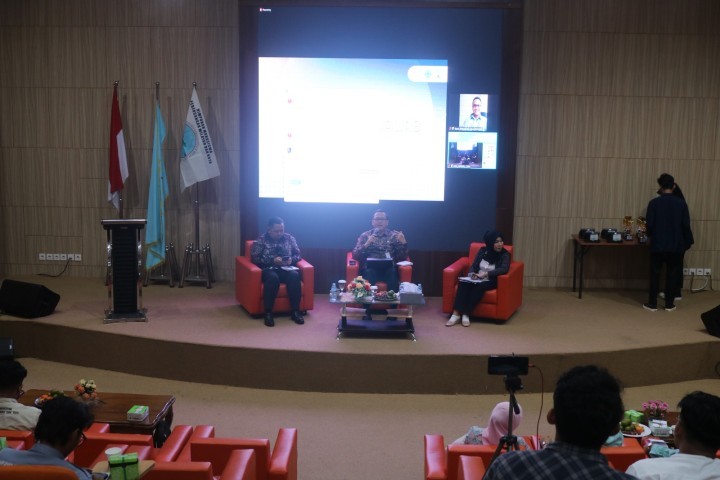
Strengthening the Development of State Border Areas in Kalimantan Island as a Support for the IKN Nusantara Region
The fact that special attention is needed regarding the proper development of border areas to reduce gaps in all aspects in order to become a developed area and be able to support all activities in border areas, especially in this case the State border area on Kalimantan Island as a support for the IKN Nusantara region which is expected to create new centers of economic growth and maximize the potential of regional resources. Therefore, to discuss the topic thoroughly and in commemoration of the National Spatial Day (Hataru) which fell on November 8, the Tanjungpura University Urban and Regional Planning Student Association held a National Seminar with the theme “Strengthening the Development of State Border Areas in Kalimantan Island as a Support for the IKN Nusantara Region” on Saturday, (19/11).
The National Seminar activity was opened by singing the Indonesia Raya song and reciting prayers followed by all participants and seminar guests. Then continued with a dance performance by Tanjungpura University Urban and Regional Planning students who symbolized three different cultures in Pontianak City, namely from the Dayak, Chinese and Malay tribes. Muhammad Ega Alphard as the chairman of the Hataru 2022 committee said that the development of IKN can have an impact on the surrounding area and based on the perspective of the border area so that the government's role is needed in answering issues for the realization of advanced development and a positive impact on the border area as a support for the IKN Nusantara region. “This development also needs to include the participation of the community in the process of developing an area so that there is a greater spread of benefits to a wider group of people,” he said. The Head of the Tanjungpura University Urban and Regional Planning Study Program, Frista Rekayasa H, S.T., M.T., said that the IKN Nusantara Development on Kalimantan Island can provide opportunities for strengthening border areas as the center of national strategic areas so that there is a need for readiness and the right strategy for border areas as IKN Nusantara supporting areas.
In his remarks he also added “I have hope that through this meeting it can provide benefits and add insight for the participants and those who have the opportunity to participate in this National Seminar activity”.he said Muhammad Agung Widodo, S.P., MIDEC as Plt. Coordinator of Spatial Planning and Regional Socio-Economic Analysis of the Ministry of PPN as one of the speakers of the following seminar explained that the relocation of the National Capital City and the development of border areas are the embodiment of the 2005-2025 RPJN, 2020-2024 RPJM, the President's Nawacita and Indonesia's Vision 2045 in order to build new growth centers and reduce gaps between regions to spur growth outside Java so that initially development tends to be Java-centric to be balanced and equitable. He also added that “The development of border areas in Kalimantan has the potential and needs to be synergized with the development of IKN based on Kalimantan's local resources”, he said. Muhammad Farid, S.STP., M.Si as Assistant Deputy for Spatial Planning of Border Areas of the National Border Management Agency who was also a resource person revealed that the development of underdeveloped regions in border areas, villages and transmigration is very important because it is related to improving welfare and sub-district governance in priority locations and developing National Strategic Centers.
“IKN on the island of Kalimantan is very important for us to carry out approaches to humanist and integrated development patterns through ministries of institutions and local governments that help interpret the development of border areas both in terms of infrastructure, economy, spatial planning and so on,” he explained M. Yodha Muhdiya, S.Sc., M.Eng, Coordinator of Cooperation and Public Relations, said that the relocation of the IKN Nusantara to the State border area in Kalimantan as a foremost region could cause behavioral changes, especially in terms of livelihoods from the primary sector to the secondary and tertiary sectors so that it is necessary to prepare skilled human resources in border areas while optimizing regional potential, especially endemic potential, optimizing cooperation forums and the role of regional institutions. Queentera Cantika Arasanda, one of the participants in the Hataru 2022 National Seminar, expressed his enthusiasm for participating in the National Seminar organized by the Tanjungpura University Urban and Regional Planning Student Association. “The holding of the National Seminar can add insight to students to continue to increase innovation in participating in dealing with development issues,” he said.
The holding of this National Seminar activity is expected to increase public awareness, knowledge and understanding of the importance of strengthening the State border area on Kalimantan Island as a support for the IKN Nusantara region and to capture community participation to be more concerned with spatial planning because the true results of spatial planning are for the benefit of all levels of society by enjoying the benefits of space in the form of economic, social, environmental benefits and for the achievement of the archipelago's spatial planning goals that are safe, comfortable, productive and sustainable.



